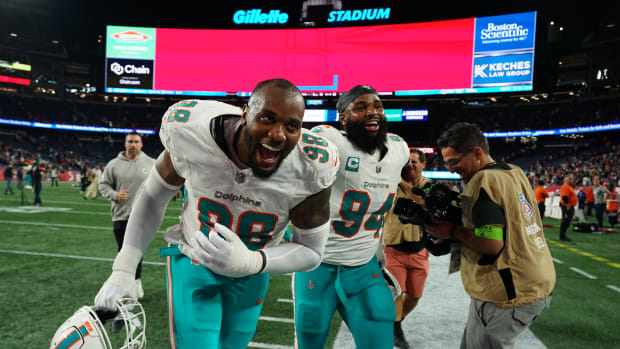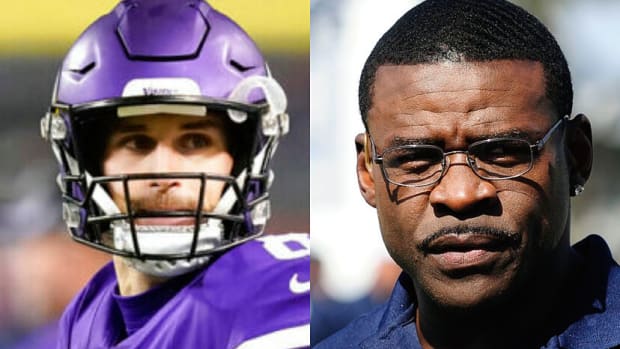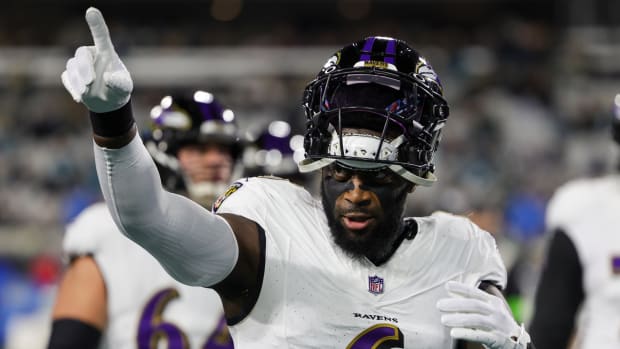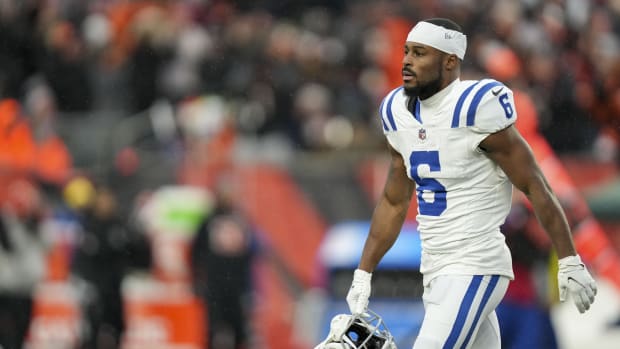Robert Kraft Charged With Soliciting Prostitution: Potential Defenses, How the NFL Might Respond
New England Patriots owner Robert Kraft has been charged by Florida authorities with two counts of soliciting prostitution, announced by Jupiter (Fl.) police chief Daniel Kerr during a press conference on Friday. Kerr detailed a multi-month investigation into human trafficking and sex trade. The alleged traffickers are accused of forcing women into sexual servitude at 10 different massage parlors in Orlando, Palm Beach County and the Treasure Coast, all of which have been shut down. Kraft is one of 25 suspects who allegedly paid for sexual acts by women who had been forced to serve in the parlors.
Kerr described evidence of the accusations against Kraft and the other men. He noted it came in part through records seized from the massage parlors—including after search warrants were executed at the parlors and possible other locations—as well as through video produced by body worn cameras and other surveillance methods. It’s also likely that statements by victims and other witnesses have played key roles for law enforcement in amassing the necessary evidence to issue charges.
The 25 suspects only represent the current wave of charges, the number which could climb into the hundreds. According to Kerr, these particular 25 suspects paid for prostitution “about a month ago.” The suspects, Jupiter police detective Andrew Sharp expressed, allegedly paid $59 for a half-hour and $79 for the full hour. Mary Helen Moore of the TC Palm has additional details on the far-reaching scope of the investigation. She notes that 165 men connected to this investigation have been accused of illegally paying for sex and more than 50 have already been arrested.
Understanding the charges brought against Kraft
Like the scores of other men who were allegedly caught in the sting operation, Kraft is accused of soliciting another person to commit prostitution. He allegedly visited the Orchids of Asia Day Spa in Jupiter on two separate occasions, presumably about a month ago per the timeline offered by Kerr. Kerr insists that video evidence confirms that Kraft, who reportedly owns a home in nearby Palm Beach, and the other 24 suspects were involved in sex acts while in a spa. Kraft, like the other suspects, allegedly paid for sexual acts, meaning the acts would not have occurred but for payment. Other details are not yet known but may appear in a forthcoming release of a probable cause affidavit.
Florida Statute 796.07 is the relevant Florida law for solicitation of prostitution. It makes it illegal to solicit or induce another person into prostitution, which is defined under Florida law as “giving or receiving of the body for sexual activity for hire but excludes sexual activity between spouses.” As to the term “sexual activity,” it is defined as “oral, anal or vaginal penetration by, or union with, the sexual organ of another; anal or vaginal penetration of another by any other object; or the handling or fondling of the sexual organ of another for the purpose of masturbation; however, the term does not include acts done for bona fide medical purposes.”
A first-time conviction of solicitation is a misdemeanor offense that does not necessarily lead to any jail time. A judge can sentence a person convicted of this offense to up to a year in jail. Other possible penalties include up to a year of probation and a $1,000 fine.
The fact that Kraft, if convicted, would be a “first-time offender” and the fact that he lacks any criminal history would be two factors that weigh strongly in his favor during sentencing. The 77-year-old billionaire’s advanced age could also sway a judge to not impose any jail sentence. If Kraft has any health issues that might be worsened by incarceration, that too would work in his favor during sentencing.
Two penalties for a solicitation conviction are required: the convicted person must perform 100 hours of community service; and pay for, and attend, an educational program about the negative effects of prostitution and human trafficking.
In other words, if Kraft is convicted of the charges, he might avoid jail but would need to perform days-worth of community service in Florida and attend an educational program, presumably with other persons who have been convicted of sex offenses. Such penalties would be highly embarrassing for Kraft, who also owns the New England Revolution. Kraft is one of the most influential persons in sports and is a generous philanthropist of many causes. He is also a friend of President Donald Trump.
It is worth noting that Kraft, like the other men who are accused of paying for sex, could face additional charges. Kerr carefully noted that Kraft had been charged with two crimes “at this time.”
Also, although this investigation is a state matter, it could become a federal one—if it isn’t one already. Indeed, human trafficking cases that involve victims who are transported internationally or across state lines are reviewed by the FBI and Justice Department and can lead to felony charges.
Kraft’s potential defenses
In a statement, a spokesperson for Kraft completely disputes the accusation: “We categorically deny that Mr. Kraft engaged in any illegal activity. Because it is a judicial matter, we will not be commenting further.”
The statement suggests that Kraft will attempt to defend himself, at least for the time being. Most cases end in plea deals, and it’s possible that will prove true with Kraft. Along those lines, it could prove significant that neither Kraft nor an attorney on Kraft’s behalf has issued a statement about the charges. Instead, only a spokesperson has commented. If Kraft later acknowledges that he engaged in illegal conduct, his hope for public forgiveness would be undermined by any prior public statements that contradict his admission. Therefore, expect Kraft to remain quiet and avoid statements that might later be used against him in the court of public opinion.
In the meantime, Kraft’s defenses could include the most basic: he didn’t do it. While Kerr claims there is video evidence of the suspects engaged in illegal acts, that video has not been made public yet. Therefore, it remains to be seen if relevant videos clearly depict Kraft. It may also take time for the video to be made public. While the video could always leak, law enforcement would likely reject any public records requests for the video on grounds of it being part of an ongoing prosecution. Even if a video unmistakably shows Kraft, it’s not certain if Kraft will be engaged in the act of solicitation while on the video. A video that shows Kraft entering and leaving the spa would be powerful influential evidence, but it would be circumstantial evidence, rather than direct evidence.
Likewise, it remains to be seen if germane financial records and witness statements compiled by law enforcement could be disputed by Kraft’s attorneys. For instance, assuming the suspects paid by cash—and not by a personal check or some other method that is linked to a person’s identity—they might argue they never paid and that there is no way of proving they paid. Kraft’s attorneys will contend that not all the elements of the crime have been met beyond a reasonable doubt.
Depending on the circumstances that led Kraft to the Orchids of Asia Day Spa, he could possibly also argue that he was a victim of entrapment. Although criminal defense attorneys are often skeptical about the effectiveness of the entrapment defense, Kraft might insist that undercover officers induced or tricked him to go the spa and commit prostitution there. Kraft would maintain that he was duped in ways that would have led any typical, reasonable person to also commit a crime. Perhaps Kraft repeatedly said no to overtures but relented after many tries. Perhaps also Kraft only intended to receive a massage while in the spa but was conned, maybe by alcohol, into a sexual act.
If you find the preceding paragraph not terribly persuasive, then you know why jurors often don’t find entrapment to be very persuasive. The fact that Kraft is accused of twice going to the spa also suggests that at least on the second occasion he had prior awareness of what was really going on.
Evaluating the NFL’s potential response to Kraft
The NFL will likely refrain from taking action against Kraft until more information is known. It’s possible, in fact, that the league will simply wait until there is resolution in the criminal case.
NFL commissioner Roger Goodell knows that if he rushes to punish Kraft and if Kraft is later cleared of wrongdoing or found not guilty, Goodell would be perceived as having wrongly punished one of the league’s most powerful owners. It’s one thing for Goodell to wrongly punish a player. It’s another for him to wrongly punish an owner: Goodell works for Kraft and other owners—and unlike the players, the owners have the exclusive ability to hire the commissioner and fire the commissioner.
Still, the league will take the allegations against Kraft very seriously. Although Kraft’s alleged criminal acts are “only” misdemeanor offenses and although there is no reason at this time to believe Kraft had any awareness of related human trafficking, the charges against him are connected to highly troubling claims of sexual servitude.
With that in mind, the NFL’s personal conduct policy applies to all NFL personnel, including owners. This means that Kraft is obligated to refrain from “conduct detrimental to the integrity of, or public confidence in, the game of professional football.” In addition, Article VII of the league constitution, which governs the legal relationship between teams, owners and the league, empowers Goodell to punish owners for “conduct detrimental to the welfare of the league.” Such punishments include suspensions and fines up to $500,000.
Any level of involvement in what may prove to be an international human trafficking ring that involves women who were forced or kidnapped into sexual servitude would reflect poorly on Kraft and, by extension, the NFL. This means if Goodell concludes Kraft is guilty, then Goodell will likely punish Kraft through a suspension and/or fine.
Also, context and precedent matter. We are living in the #MeToo era where mistreatment of women has taken on far greater social significance. The NFL and its sponsors are aware of that, and expect everyone connected to the NFL, be they owners, coaches or players, to behave responsibly and treat others with respect.
The league also recently punished one owner who was accused of personal misconduct in his treatment of women. Last June, the NFL fined Carolina Panthers owner Jerry Richardson $2.75 million after investigating and substantiating claims first uncovered by Jon Wertheim and Viv Bernstein’s Sports Illustrated investigative report. Richardson was accused of engaging in sexual harassment and inappropriate physical contact with at least four women employed by the team. He also allegedly made racist remarks. While the NFL did not force Richardson to leave the Panthers, Richardson announced plans to sell almost immediately after the SI story was published (he would later sell the team to David Tepper).
The Richardson and Kraft situations share the common trait of an owner accused of mistreating women. However, there are major differences. Richardson was accused of mistreating women who worked for him over a period of years, whereas Kraft is accused of two specific incidents involving persons unconnected to the Patriots. In that sense, Richardson’s misconduct was much more closely tied to the NFL and its identity. This is particularly true with respect to opportunities for women to work for NFL teams and to work in safe and respectful team environments.
Goodell might also review his punishment of Indianapolis Colts owner Jim Irsay in 2014 after Irsay pleaded guilty to a misdemeanor charge for operating a vehicle while under the influence. Goodell suspended Irsay, who admitted to being under the influence of drugs, six games and fined him $500,000.
At the same time, Goodell might consider that he declined to punish Minnesota Vikings owner Zygi Wilf after a New Jersey court in 2013 found he had broken civil state racketeering laws and employed fraudulent bookkeeping practices in a business transaction. Likewise, Goodell declined to punish Cleveland Browns owner Jimmy Haslam after a company he owns, Pilot Flying J, and more than two dozen of its employees were accused of fraud. Some of those employees also later pleaded guilty. Haslam, however, was not charged with any wrongdoing.
If Kraft admits to wrongdoing or is found guilty of wrongdoing the mostly likely NFL outcome would be that he is suspended and/or fined. It’s also possible Kraft could temporarily or even permanently lose his membership on influential NFL committees.
As to possible loss of draft picks for the Patriots over Kraft’s alleged misconduct, don’t expect that to happen. Article VIII contemplates the loss of draft picks as suitable when misconduct “affects the competitive aspects of the game.” Personal misbehavior by an owner is unrelated to the competitive aspects of the game.
In addition, a loss of draft picks penalty would arguably seem misplaced given the nature of the accusation. There is no logical relationship between soliciting sex from a person who had been victimized by trafficking and docking a team’s draft pick. A much more coherent penalty would be one where Kraft, assuming Goodell finds him at fault, is urged to make a large donation to an organization that combats human trafficking. Recall how this type of arrangement was used by NBA commissioner Adam Silver and Dallas Mavericks owner Mark Cuban after the Mavericks were found to have a toxic workplace environment. Cuban agreed to donate $10 million to organizations that promote women in leadership roles and that develop policies to combat domestic violence.
Could Kraft be forced to give up ownership of the Patriots over this matter?
Some might wonder if Kraft could be forced to sell his franchise or turn over control of it to other members of his family, such as team president Jonathan Kraft. When Richardson put the team up for sale immediately after Wertheim’s story, some speculated that the NFL had forced him out. It’s possible the NFL requested that Richardson sell the team, but in no way could the league have forced Richardson out so quickly.
In order to forcibly remove an owner from an NFL team, Article VIII of the league constitution would be invoked. Under it, the commissioner or an owner on the Executive Committee can bring charges against an owner for conduct detrimental to the league. If sustained by a minimum of 23 of the 31 teams’ principal owners (the principal owner who is charged is excluded from the vote), ownership in a team can be terminated.
It is extremely unlikely that 23 owners would vote out Kraft over a misdemeanor offense. Owners would likely find such a punishment excessive in light of the absence of prior examples of owners being voted out. Likewise, owners would be worried about precedent—if Kraft could lose his team over (allegedly) solicitation of sex, other owners could lose their team over offenses of similar magnitude.
Kraft’s situation is clearly dissimilar to that of former Los Angeles Clippers owner Donald Sterling. In the aftermath of Sterling’s racist comments and Silver recommending that Sterling be forced out of the league, Sterling’s wife, Shelly Sterling, took over control of the family trust by having her husband declared mentally incapacitated. In contrast, Kraft is seemingly in good health and will not be removed from control of his team by family. Kraft is also a well-respected and well-liked business person who has been very generous with his wealth and very loyal to the NFL. Sterling as a team owner was basically the opposite of Kraft. Sterling had a long history of battling the NBA and his fellow owners. In fact, in 1984, Sterling relocated the Clippers from San Diego to L.A. over league objections and in spite of a lawsuit. Sterling was also accused of multiple acts of racism during his ownership of the Clippers and business career. And yet even with Sterling’s troublesome record, he lost the Clippers not by being voted out by NBA owners but by being outmaneuvered in court by his wife.
To the extent Kraft “loses” the Patriots, it would likely be voluntarily and only in limited ways. Goodell, for instance, might encourage Kraft to turn over more authority to his family. Given that Kraft is 77 years old, such delegation of power will likely be occurring anyway in the approaching years.
Presidential pardon power won’t help Kraft with state charges
Some might wonder if Kraft could hope for assistance from President Trump, especially after the president said that he was “very surprised to see [the charges].” Under Article II, Section 2 of the Constitution, the president has the pardon power. It allows the president the “power to grant reprieves and pardons for offenses against the United States, except in cases of impeachment.” This pardon power, however, is limited to federal crimes, not state crimes. Kraft is charged under Florida law.
Michael McCann is SI’s legal analyst. He is also Associate Dean of the University of New Hampshire School of Law and editor and co-author of The Oxford Handbook of American Sports Law and Court Justice: The Inside Story of My Battle Against the NCAA.
Question or comment? Email us at talkback@themmqb.com.




































